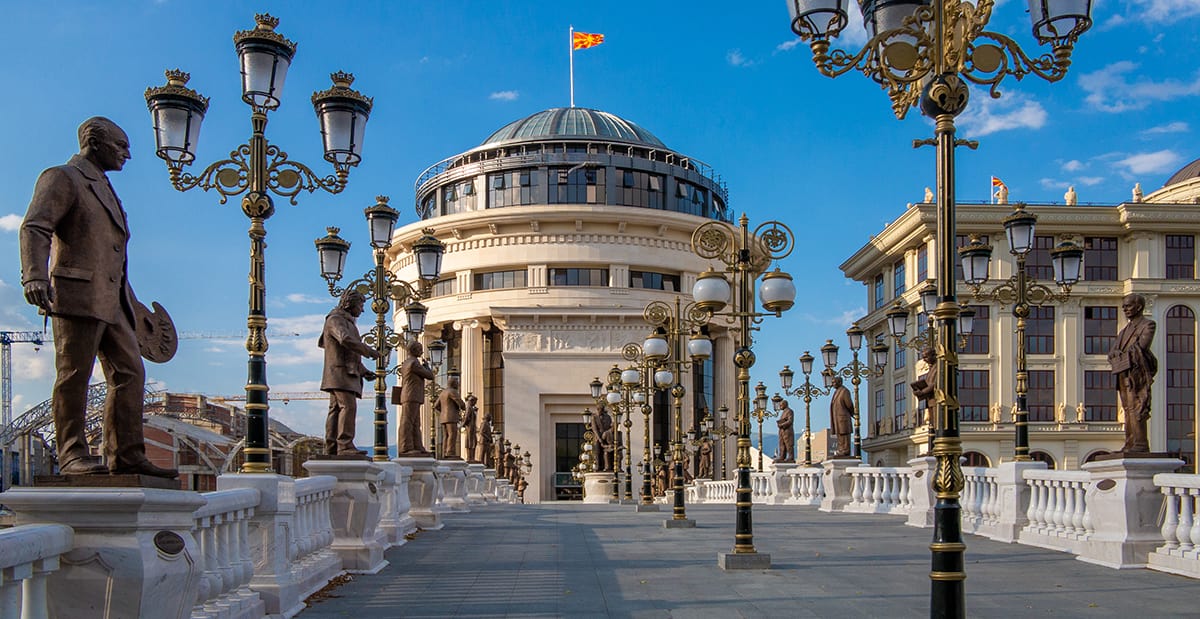A lively export sector is helping boost North Macedonia out of the Covid-19 crisis.

|
NORTH MACEDONIA: VITAL STATISTICS |
|---|
|
Location: Southeastern Europe |
|
Neighbors: Albania, Kosovo, Serbia, Bulgaria, Greece |
|
Capital city: Skopje |
|
Population (2019): 2,076,255 (currently posted official estimate) Last census, 2002. Accurate population count not known; lack of accurate count inhibits infrastructure and social planning. |
|
Official language: Macedonian |
|
GDP per capita (2019): US$6,022.20 |
|
GDP growth (2019): Est. -5.1% |
|
Inflation (2019): 0.8% |
|
Currency: Denar |
|
Investment promotion agency: Invest North Macedonia |
|
Investment incentives available? Exemptions on taxes and duties in TIDZs; assistance with training; job creation subsidies; capital investment subsidies |
|
Ease of Doing Business rank (2020): 17 |
|
Corruption Perceptions Index rank (2019): 106 |
|
Political risks: Uncertainty over admission to the EU, as Bulgaria appears unlikely to drop its objection; legislative blockade including budget at time of writing |
|
Security risks: Pickpocketing; purse snatching; credit card and ATM fraud; muggings of foreigners; frequent demonstrations; occasional interethnic violence |
|
PROS |
|---|
|
Good trade relations with Greece following resolution of a name dispute |
|
Greece is now a major investor |
|
Shipping through Greek ports |
|
CONS |
|---|
|
Country is landlocked |
|
Government reliance on public money to fund infrastructure |
|
Oversaturated media market has led to bankruptcies |
|
Secondary roads poorly maintained |
|
Sources: Balkan Insight, CIA World Factbook, The Economist, Government of Canada Global Travel Advisory, International Monetary Fund, Republic of Macedonia State Statistical Office, Reuters, Transparency International, US State Department, World Bank |
|
For more information, check out Global Finance‘s North Macedonia Economic Report data page. |
Economically speaking, most former Communist countries fall between a less strictly directed version of the Soviet command economy and a Western-style market economy. North Macedonia has been moving toward the market model, says Viktor Mizo, managing director of Kostal Macedonia, a Ohrid-based unit of the Skopje Kostal Group, and former head of the North Macedonia Free Zones Authority and of the government’s investment and export promotion agency.
“We are certainly much more than 50% towards that end [of the spectrum],” he says. “There are some state-run activities, but still significantly less.”
North Macedonia’s economy took two major hits during 2020. Production fell due to the pandemic and exports to the rest of Europe declined as a result of the economic downturn there.
In the second quarter, GDP decreased by 14.9%; then another 3.3% in the third quarter. In early January, Finance Think, a think tank based in Skopje, estimated a GDP decrease for all of 2020 of 4%. “Currently, we are faced by the general global crisis,” says Blagica Petreski, chief economist and CEO at Finance Think. “We went through a recession in the second quarter,” and the country remains under lockdown.
Once the crisis subsides, the promising facets of North Macedonia’s economy should again become more visible, says Anthony Kim, research analyst at the Washington, DC-based Heritage Foundation, who visited twice recently on research trips. “North Macedonia is a frontier and potentially an emerging market,” he says. It possesses a well-educated largely English-speaking labor force; and a banking sector that is stable, resilient and continuing to evolve.
Government measures to attract foreign direct investment (FDI) include tax breaks for greenfield and brownfield projects; and, with some exceptions, it treats domestic and foreign companies equally. A chain of tax-advantaged Technological Industrial Development Zones (TIDZs), which offer investors personal and corporate income tax exemption for the first 10 years, are a major attraction, says Olimpija Zaevska, fellow at the Copenhagen Business School, Department of International Economics, independent consultant and former adviser to the North Macedonia Prime Minister.
Finance Think expects pharmaceuticals and automotive will see investment come back fastest. Services, food, drinks and tobacco will also see exports pick up. As of 2018, the Observatory of Economic Complexity listed Romania as the destination for 21.8% of auto parts exports from North Macedonia, followed by Slovenia (2.84%), the Netherlands (0.8%) and Mexico (0.49%).
Foreign investors in North Macedonia face complex bureaucratic procedures and, for those who find themselves needing recourse to the law, long delays in court. FDI inflows would likely be steadier with stronger enforcement of anti-corruption regulations, and a “one-stop shop” for regulatory matters.
Due to the pandemic’s supply chain disruptions, “many investors are cautious and focus on predictable and proximate business environments,” Zaevska says. “But with a government with a fresh mandate and good track record of dealing with investors, as well as North Macedonia’s geographical location, the country is well positioned to continue with an upward FDI trend in 2021,” according to the report.



